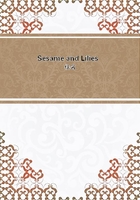
第19章
Note broadly in the outset, Shakespeare has no heroes;--he has only heroines. There is not one entirely heroic figure in all his plays, except the slight sketch of Henry the Fifth, exaggerated for the purposes of the stage; and the still slighter Valentine in The Two Gentlemen of Verona. In his laboured and perfect plays you have no hero. Othello would have been one, if his simplicity had not been so great as to leave him the prey of every base practice round him;but he is the only example even approximating to the heroic type.
Coriolanus--Caesar--Antony stand in flawed strength, and fall by their vanities;--Hamlet is indolent, and drowsily speculative; Romeo an impatient boy; the Merchant of Venice languidly submissive to adverse fortune; Kent, in King Lear, is entirely noble at heart, but too rough and unpolished to be of true use at the critical time, and he sinks into the office of a servant only. Orlando, no less noble, is yet the despairing toy of chance, followed, comforted, saved by Rosalind. Whereas there is hardly a play that has not a perfect woman in it, steadfast in grave hope, and errorless purpose:
Cordelia, Desdemona, Isabella, Hermione, Imogen, Queen Catherine, Perdita, Sylvia, Viola, Rosalind, Helena, and last, and perhaps loveliest, Virgilia, are all faultless; conceived in the highest heroic type of humanity.
Then observe, secondly,The catastrophe of every play is caused always by the folly or fault of a man; the redemption, if there be any, is by the wisdom and virtue of a woman, and, failing that, there is none. The catastrophe of King Lear is owing to his own want of judgment, his impatient vanity, his misunderstanding of his children; the virtue of his one true daughter would have saved him from all the injuries of the others, unless he had cast her away from him; as it is, she all but saves him.
Of Othello I need not trace the tale;--nor the one weakness of his so mighty love; nor the inferiority of his perceptive intellect to that even of the second woman character in the play, the Emilia who dies in wild testimony against his error:-"Oh, murderous coxcomb! what should such a fool Do with so good a wife?"In Romeo and Juliet, the wise and brave stratagem of the wife is brought to ruinous issue by the reckless impatience of her husband.
In Winter's Tale, and in Cymbeline, the happiness and existence of two princely households, lost through long years, and imperilled to the death by the folly and obstinacy of the husbands, are redeemed at last by the queenly patience and wisdom of the wives. In Measure for Measure, the foul injustice of the judge, and the foul cowardice of the brother, are opposed to the victorious truth and adamantine purity of a woman. In Coriolanus, the mother's counsel, acted upon in time, would have saved her son from all evil; his momentary forgetfulness of it is his ruin; her prayer, at last granted, saves him--not, indeed, from death, but from the curse of living as the destroyer of his country.
And what shall I say of Julia, constant against the fickleness of a lover who is a mere wicked child?--of Helena, against the petulance and insult of a careless youth?--of the patience of Hero, the passion of Beatrice, and the calmly devoted wisdom of the "unlessoned girl," who appears among the helplessness, the blindness, and the vindictive passions of men, as a gentle angel, bringing courage and safety by her presence, and defeating the worst malignities of crime by what women are fancied most to fail in,--precision and accuracy of thought.
Observe, further, among all the principal figures in Shakespeare's plays, there is only one weak woman--Ophelia; and it is because she fails Hamlet at the critical moment, and is not, and cannot in her nature be, a guide to him when he needs her most, that all the bitter catastrophe follows. Finally, though there are three wicked women among the principal figures--Lady Macbeth, Regan, and Goneril--they are felt at once to be frightful exceptions to the ordinary laws of life; fatal in their influence also, in proportion to the power for good which they have abandoned.
Such, in broad light, is Shakespeare's testimony to the position and character of women in human life. He represents them as infallibly faithful and wise counsellors,--incorruptibly just and pure examples--strong always to sanctify, even when they cannot save.
Not as in any wise comparable in knowledge of the nature of man,--still less in his understanding of the causes and courses of fate,--but only as the writer who has given us the broadest view of the conditions and modes of ordinary thought in modern society, I ask you next to receive the witness of Walter Scott.